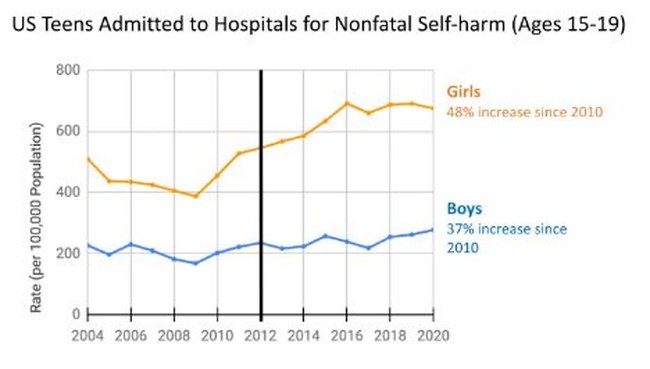You’re probably familiar with Jonathan Haidt, the author of The Righteous Mind and The Coddling of the American Mind: How Good Intentions and Bad Ideas Are Setting Up a Generation for Failure. Haidt is working on a new book titled Kids In Space: Why Teen Mental Health is Collapsing. As you can tell from the title, the general idea is that there is a crisis of teen mental health, a crisis that Haidt believes is connected to raising kids in a new era of social media and cell phones.
But as he admits in this piece, he’s had a lot of pushback from people who argue that he’s effectively just another old man shouting “Kids these days!” He directs readers to an amusing Twitter thread of adults complaining about spoiled kids all the way back to 1895:
1938 pic.twitter.com/rhj7ZttcXy
— Paul Fairie (@paulisci) December 7, 2022
1914 pic.twitter.com/BAqqT5dOfd
— Paul Fairie (@paulisci) December 7, 2022
1895 pic.twitter.com/QgSEAxwCUv
— Paul Fairie (@paulisci) December 8, 2022
Haidt acknowledges that there definitely is a pattern here, one that often seems to involve kids and new technology. So he accepts up front that the burden of proof is on him to show that he’s not just the latest in a long line of old people complaining about spoiled kids. And taking that as a starting point, he proceeds to lay out just some of the evidence that will appear in his book. The evidence is part of a document on teen mood disorders he has been assembling with a research assistant named Zach since 2019.
Do members of Gen Z say that their mental health is declining? Yes, in every study we can find. We cannot find any studies on the other side…
Here are two of the graphs you’ll find in section 1 of the Collaborative Review document:
As you can see in Figure 2, and in most of the figures in the review doc, there was no sign of a problem before 2010, and the epidemic is well underway by 2015. You can also see that the rate of depression is much higher in girls, as is the absolute increase (since 2010 an additional 18% of girls suffered from depression in 2021, compared to an additional 6% of boys). However, the relative increase is similar in both sexes: around 150%. The rate had more than doubled before the Covid epidemic.
One of the arguments Haidt has heard in response is that increased diagnosis of depression could “reflect only a change in Gen Z’s willingness to disclose their struggles, which is a good thing.” But Haidt points out that it’s not just more kids saying (or admitting) they are depressed, it’s also more kids trying to actually hurt themselves.
Figure 4 shows the number per 100,000 older teens who are admitted each year to hospitals because they harmed themselves, mostly by cutting themselves with sharp objects. Once again there is no sign of a problem before 2010, and the epidemic is raging by 2015.
There’s more to this which you can read in full at the link but Haidt’s conclusion is that something really has changed since about 2010-2012 when it comes to teen mental health. The broader argument that this is connected to social media will appear in the book which is set to be published early next year. But you can get a bit of it from his working document:
Nearly all researchers now agree that there are correlations between (crude measures of) time spent using social media and (crude self report measures of) mental health problems, but there is heated disagreement about the size and significance of these effects. Some researchers believe the correlations are in the ballpark of r = .04, and are of no practical significance; others find that the correlations are between r = .10 and r = .20, which is the size of many other public health threats.
And in describing a study of screen time and mental health, Haidt writes:
The authors find curvilinear effects in which one or two hours a day is associated with better outcomes than is zero usage, yet after that, outcomes become worse. The lowest “goldilocks point” and sharpest drop is for “using smartphones,” which is the category likely to include most social media use.
That’s just a response to one of many studies collected for consideration but it might give a hint of where his analysis will go. In any case, parents will be interested in the argument about what is driving the epidemic of mental health among teens.









Join the conversation as a VIP Member